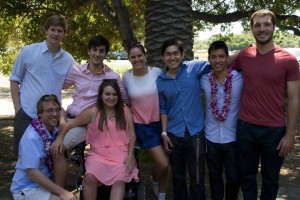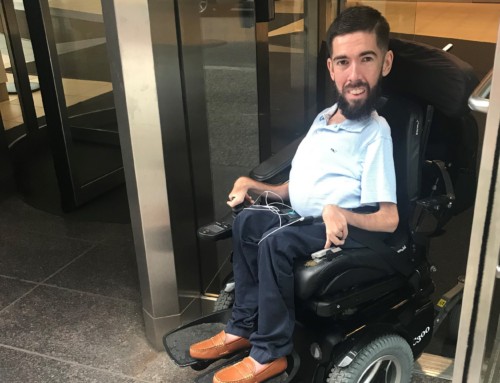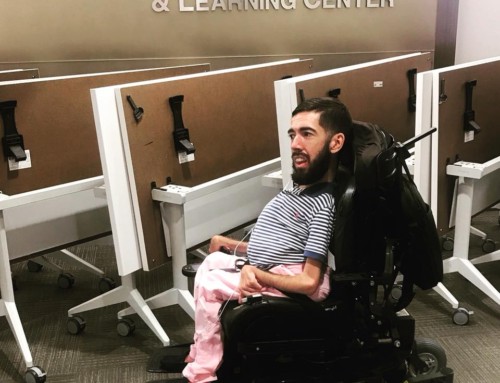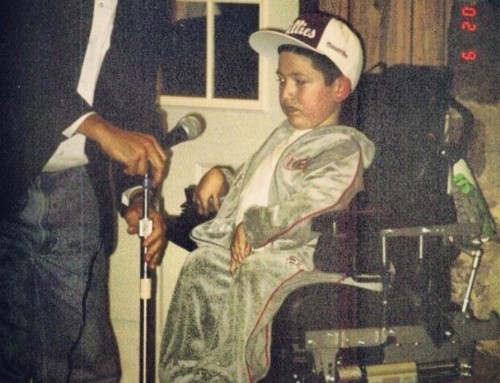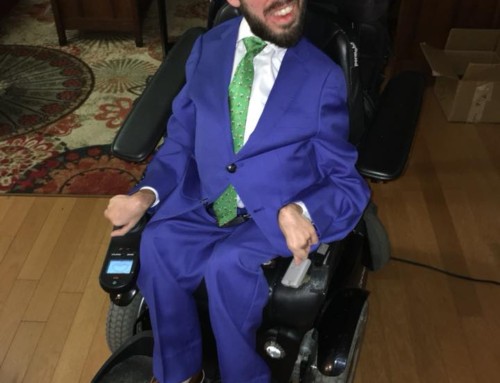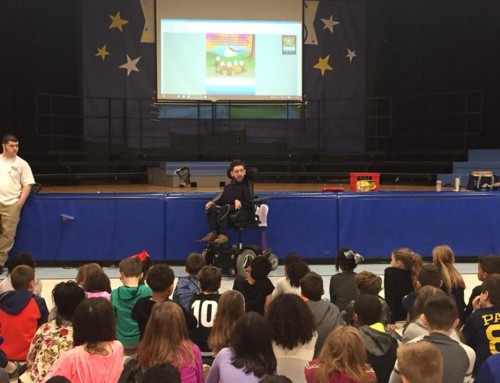For our second featured blogger, we have a good friend of many years, Morgan Duffy! Her and I met when we were kids at Muscular Dystrophy Camp at the Variety Club. We are very grateful she is willing to share her experience with online dating!
When Jack asked if I was in an accident, I considered clutching my purse, turning on my wheelchair, and racing for the door. In one short question, a stranger on a blind date managed to combine ignorance with the childish hopefulness that my wheelchair was temporary. Maybe if he was lucky, I’d get right up and walk out of the restaurant that night. Despite my discomfort, I encouraged him to keep asking. No stranger ever had the courage to ask.
“So, what do you like, do?”
“How did you get here?”
“Can you, um, like, can you… you know?”
The questions kept coming and I found myself, someone who is usually open and chatty, retracting into my leather jacket and oversized scarf. I like to be with my friends and I love to try new restaurants. I take the public bus, but sometimes I’ll wheel quickly with headphones on to enjoy a breezy San Francisco night. And yes, in fact, I can have sex. I smiled with each answer, a qualifying reassurance that I am a happy person. Yet, his face grew more somber with each minute. I felt like I was selling myself to someone whose expectations hovered around sea level, regardless of what I actually said.
I was diagnosed with Spinal Muscular Atrophy when I was two years old. At ten, I got my first power wheelchair and was able to play kickball with my friends. At 18, I moved across the country to go to college. At 20, I decided to live with my best friend in Indonesia for a summer. And at 22, I graduated from college and moved into my first apartment. Each memory and milestone has accompanying stories about crappy accessibility, hilarious comments from strangers, and tireless support from family and friends. When I was on this date, I found myself leaving out those details in hopes of him forgetting where I was sitting. Maybe I wanted to forget it for that moment, too.
But, forgetting gets me nowhere. I don’t want to forget my disability, or ignore my reality. Leaving out the details of makeshift ramps, innocent questions from children, and unfortunate wardrobe malfunctions feels disingenuous. It’s less fun. On another date, I tried to find a similarity with someone who worked in a lab on campus that specialized in neuromuscular diseases by exclaiming, Oh that’s what I have! The silence followed made me laugh out loud, spilling my coffee slightly onto my dress. Eventually he laughed too.
Having a disability is a daily litmus test of personal encounters. How accepting will another person be? The spectrum varies vastly, from those who run in the other direction to those who immediately compare you to their grandmother or distant cousin.
After he ended his questions Jack explained, “I’m really sorry, I just don’t know what to expect.” The honesty in his voice was humbling. There’s the phrase I was waiting for: I don’t know. Unless you are someone with a similar experience or a have loved one who has a similar experience, chances are you won’t know what to say or what to do. The universality of difference is simultaneously beautiful and demanding, as it gives us the responsibility to admit what we do not know and learn from the person sitting across the table. At this stage in my life, like friends all around me jumping into the online dating scene, most of those tables are at restaurants in San Francisco, with a perfect stranger listening apprehensively to each word.
All I could say was, “That’s absolutely okay. I don’t expect you to know.”
On dates, at work, and even with my closest friends, I often attempt to take on the burden of my disability, profusely apologizing for the inconveniences it may cause to others. I take it on myself to be as independent and forward thinking as possible, but the reality is that sometimes it is on others to educate themselves to make the environment more inclusive.
I sit on my baggage, and the entire world can see it. Others can make judgments or ask questions, and that’s completely up to them.
And no, we did not go on a second date.
Morgan Joan Duffy, a native of Scranton, PA, is a recent Stanford University grad living in San Francisco. She currently works in the tech industry and has hopes of maybe going to law school one day. In her spare time she enjoys gawking at pugs, writing non-fiction, and wine tasting with friends. Disability advocacy is one of her passions, and she encourages you to reach out to her with comments about this piece. Follow her at @morganjduffy for sporadic updates on disability and health news.
![[dis]ABLE Logo](https://disablethebrand.com/wp-content/uploads/2014/05/jimmy-logo-1-200.jpg)
